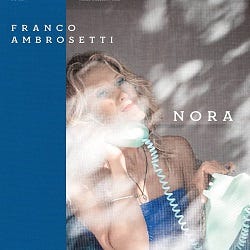Franco Ambrosetti - Pure Romance
Nora (Enja, 2022) and Sweet Caress (Enja, 2024)
Whenever a jazz "...With Strings" recording is released, a bulk of writers will invariably cite the recordings made by Charlie Parker With Strings (Verve, 1995) in 1949 and '50, with more than a few adding Clifford Brown With Strings (EmArcy, 1955), just to season the implied comparisons. the Cliffor Brown recording looms large in the present discussion While historical masterpieces, the string arrangements on both represent the sentiment of the period with the recording sound and sonics revealing the same. Tenor saxophonist Stan Getz’s Focus (Verve, 1962), alto saxophonists Art Pepper’s Winter Moon (Galaxy, 1981) or Jim Snidero‘s Strings (Savant Records, 2021) might be a more appropriate citation for Swiss trumpeter Franco Ambrosetti’s Enja “Immersive Sound Format” strings recordings Nora and Sweet Caress. But that is a critical quibble. Ambrosetti and stings were made for one another, and the two together were made for pure romance.
Nora and Sweet Caress are not the first “with strings” recordings made by Ambrosetti. The trumpeter released Sleeping Gypsy (Gryphon, 1980) with Don Sebesky, who did some impressive things with Chet Baker on She Was Too Good To Me (CTI Records) six years before.
Trumpeter/flugelhornist Franco Ambrosetti’s original composition “Nora” could have been written for a dozen soundtracks. His flugelhorn sound with strings is universal and maybe a part of our collective unconscious. That makes a great recording. “Where have I heard that before?” “Well, that is the best part, ‘Nowhere, everywhere, right now.’” Timeless is what describes these flugelhorn musings. The sound is lush beyond endurance. Ambrosetti’s tone is beautiful, soft, round, and uniformly distributed through his register. With few notes, Ambrosetti can fill in the sonic corners of a song with the ethereal. Guitarist John Scofield takes a wide latitude to solo in that ingenious fractured but integrated style is his alone. And the band besides Scofield? Pianist Uri Caine, bassist Scott Colley, drummer Peter Erskine, and violinist/concert master Sara Caswell. Oh, and Alan Broadbent, arranger and conductor. Formidable forces to be brought to the ball.
Ambrosetti’s setting for Miles Davis’ “All Blues” is beautifully complex, sporting an angular solo by Caine and some inventive string arrangements. It is a superior to a similar performance by Chet Baker in Amsterdam with the NDR Big Band just days before his death (though that performance has its charm). “Autumn Leaves” begins almost broodingly. Ambrosetti switches to a muted trumpet, providing the standard a splash of Davis before making it his own. Which he does halfway through the song, when he switches to flugelhorn. It is sublime, as is this entire recording? Several writers at the time wondered about a sequel.
With wonder and hope becoming tangible, Sweet Caress was recorded almost two years later and with the same band (sans Caine). Alan Broadbent (who plays piano here) and Sara Caswell also returned in their previous roles as arranger/conductor and concertmaster, respectively. Nora would be a hard act to follow. Ambrosetti’s original compositions dominate this recording, beginning with the title piece bearing a long orchestrated introduction building an exquisite tension before the flugelhornist’s first notes. And, in that, is the rub. Ambrosetti never plays on the song. His composing is the only feature. “Sweet Caress” may not be “Nora” but is nakedly sumptuous, warm and breathy like a contented sigh. “Colors Of The Wind” and “When The Sun Never Sets” are full-throated ballads featuring Ambrosetti’s beautiful tone.
Mal Waldron’s “Soul Eyes” was an inspired choice for inclusion, featuring Ambrosetti and Scofield equally in a ruminative setting. The J. Russell Robinson composition “Portrait of Jennie” is a significant inclusion, as it is also found on Clifford Brown With Strings (EmArcy, 1955) an album that loomed large in Ambrosetti’s youth. A comparison of the two performances reveals how special they are in their own context.





❤️
What a beautiful player.